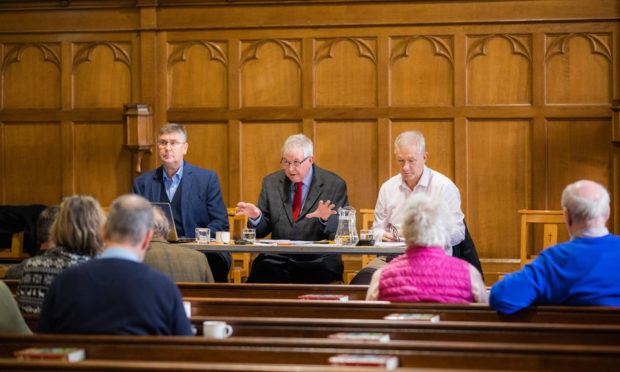
Binn chiefs quizzed over £70m Glenfarg incinerator project
Binn Group bosses held talks with local residents yesterday to share details of their plans for a £70 million incinerator at Glenfarg EcoPark.
by Ross GardinerThe waste management giant, which employ around 150 people locally, is looking to install an energy from waste (EfW) furnace.
The firm says it is the most sustainable way to deal with waste which cannot be reused or recycled, particularly since Brexit may affect options for shipping it elsewhere in future.
Chiefs spoke to community groups and local politicians at Dunbarney Church in Bridge of Earn at two meetings yesterday.
They say the scheme will produce enough energy to power more than 14,500 homes while generating more than £900m and creating 30 full time permanent jobs, along with 200 construction roles.
Project manager Stuart Fraser said: “At Binn, we recycle or reuse around 70% of the waste that comes in. The rest is converted into solid recovered fuel which is baled and shipped to Europe. This isn’t sustainable in the long run and Brexit could affect shipping.
“EfW is the most sustainable opportunity in the local area. There are 48 operational EfW incinerators in the UK and 14 more under construction. This will be the sixth smallest.”
The plans would require around 33 lorry movements to and from Binn Farm each day and residents have raised fears about the impact on roads around Glenfarg.
Bosses have pledged they will meet communities to discuss what measures could be taken, such as signs instructing drivers to use the M90 slip road at Bridge of Earn instead.
They say that even at maximum capacity, they would still have significantly fewer trucks coming in and out the farm than when they stopped sending waste to landfill in 2006.
If Perth and Kinross council planners sign off on the plans, up to 84,900 tonnes of non-recyclable rubbish could be burnt at the plant, which could be operational as soon as early 2023.
The company says the net benefit of burning waste to create fuel would mean a reduction of between 9,000 and 16,000 tonnes of carbon dioxide being emitted into the atmosphere.
Members of the public are being urged to air their views on the project via the local authority’s website.
Previous plans for smaller scale incinerators were approved in 2007 and 2011, and legally the firm still has permission to press ahead with those designs if they wish.